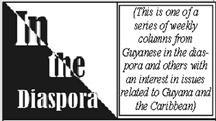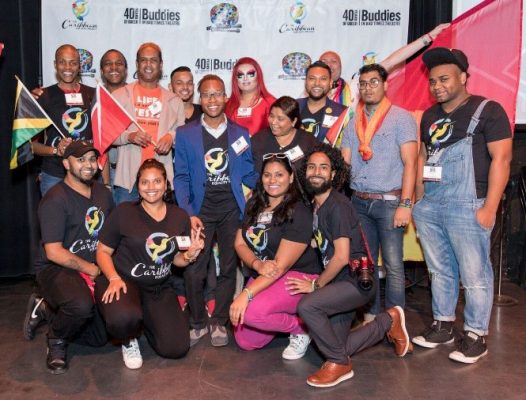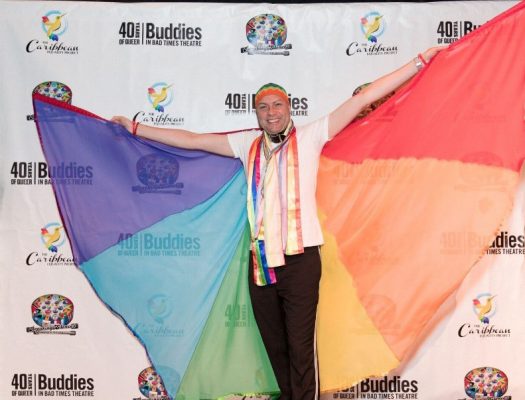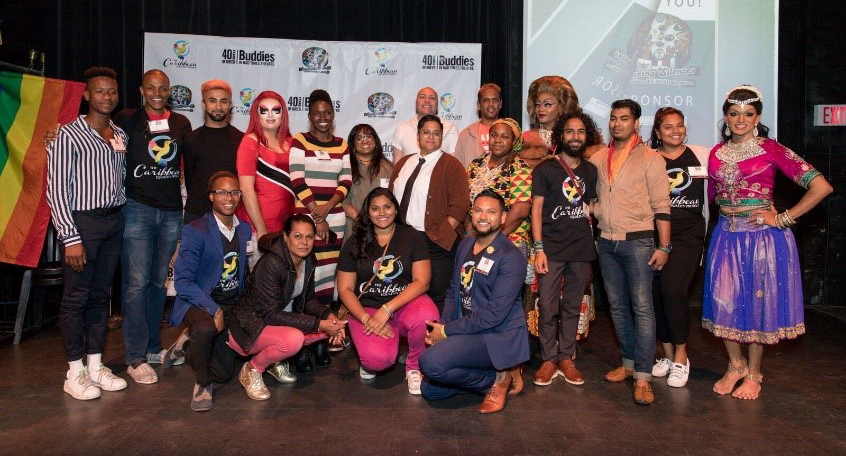
Queer Caribbean spaces in Toronto offer sites of joy, community, and visibility for LGBTQI Caribbean-Canadians. I remember the excitement I felt when I began to attend queer Caribbean events at age 19. Queer performers such as Caribbean burlesque artists like Zyra Lee Vanity, Imogen Quest and Kage Wolfe used comedy, strip-tease and dance to deliver powerful assertions of Caribbean sexuality in the city’s west end while Caribbean drag queens with names such as Michelle Ross, Tynomi Banks, Devine Darlin, Jada Hudson, Priyanka Love, Lady G and Vitality Black commanded stages at drag bars such as Crews and Tangos and Woodys. In all their glamour and spectacle, they enticed audiences with incredible ease and power, sometimes lip-syncing to Caribbean voices – soca, reggae, or dancehall – that we could recognize in seconds, singing along to every word.
In special instances, particularly during Pride Toronto, sometimes popular Caribbean soca artists headlined these spaces such as Destra Garcia and Alison Hinds. Their performances provided us with powerful affirmations that our musical idols – the producers of the soundtracks we heard growing up in our family kitchens, at our family functions, on Caribbean radio – valued queer Caribbean communities. Queer Caribbean partygoers in these spaces were able to perform a kind of freedom not often available in other Caribbean festivities such as Caribana, Toronto’s annual carnival, that has still made very little room, if any at all, for expressions of same-sex love and desire to be tolerated or accepted.

The existence of queer Caribbean spaces in Toronto are crucial as they generate forms of self-determined and self-defined sexual difference, offering participants the means to live in their own image of what it means to be queer and Caribbean. Community organizations such as “Blackness YES”, “The Rude Collective” and “Lit Productions”, queer soca fêtes, community youth programing, panel discussions, demonstrations – have all been key in unapologetically making visible queer of colour experiences, narratives and issues within the landscape of queer Toronto that has for far too long privileged those of white queers.
A queer Caribbean organization has not yet been established to address the diversity of the region and its diasporas in Toronto. Instead, queer community organizations in the city are often divided along racial and ethnic lines that complicate the issue of belonging for many Caribbean communities in Toronto. In Toronto, the goals of many existing queer Caribbean organizations have predominantly focused on creating spaces for queer Afro-Caribbeans. With the exception of a few queer non-black community organizations in the city, we have yet to see similar types of queer organizing and advocacy work that merges two dominant diasporic Caribbean communities in Toronto: Anglophone Afro- and Indo-Caribbeans. What would it mean if queer Caribbean organizing fully recognized the multicultural nature of the Caribbean region and its diasporas? What potentials, solidarities and forms of healing could it offer?
In 2017, out of a yearning for queer Caribbean togetherness, I sought to build a space 
Initially, I was attracted to the Caribbean Equality Project’s commitment to performing queer advocacy work that was inclusive of Afro- and Indo-Caribbean communities in New York City. The Caribbean Equality Project has worked to amplify and centre the voices of lesbian, gay, bisexual, transgender and queer people of Caribbean origin and descent through community organizing, education, and cultural, and social programming. According to executive director Mohamed Q. Amin: “we acknowledge the disconnection among the queer Indo- and Afro-[Caribbean] population in New York City and wanted to make sure that [we] could serve as a voice of the whole community.” Hoping to extend some of this important work into Toronto, we created a space of much-needed dialogue that would bring these often divided communities in Toronto together in solidarity.
Established in 2015, the Caribbean Equality Project began with the efforts of three queer Caribbean men in NYC, Amin included, who wanted to respond to increasing anti-queer hate crimes in the city. The organization began by initiating small focus groups and creating safe spaces in the city for queer Caribbeans to share their stories and access supportive resources. Recently, it has expanded to form extensive programming including numerous focus groups, a support group called “Unchained”, an oral history documentary series entitled “My Truth, My Story” and panel discussions. It also offers housing, judicial and emotional support to those living in vulnerable and violent circumstances in the Caribbean region and seeking asylum in the US. Current projects also include the development of a demographic survey to map queer Caribbean populations in NYC and chart experiences with immigration in an effort to forge stronger relationships with existing queer advocacy groups based in the Caribbean. “Mobilizing government resources, public officials, [there] has to be evidence of [the] needs of the community,” said Darren Glenn, board member and volunteer with the Caribbean Equality Project. “There’s no data that centers and focuses on our experiences. The government is not seeing [us] and so, [the] survey we’re developing can support the community and will speak to the government level.”
One of the key highlights of the Toronto conference was a keynote presentation by Trinidadian LGBTQI activist, Jason Jones. Jones’ challenge to the state of Trinidad and Tobago sought to dismantle the colonial buggery laws that criminalized same-sex desire under sections 13 and 16 of the Sexual Offences Act, that just in September have been deemed unconstitutional. His presentation highlighted the queer advocacy work of important organizations in the Caribbean region, the role of the diaspora and reminded us of the possibilities of LGBTI Caribbean activism that have yet to unfold. It is with conversations such as these that we must acknowledge that queer liberation cannot solely be performed without continual dialogue with the Caribbean region. Freedom does not come unless it is available for the collective.
Breaking Silences was meant to do exactly what its title indicates. Queerness in the Caribbean region is often seen as something foreign and “un-Caribbean” in too many of our communities, which makes our struggles, experiences and lives invisible. Our work with this conference sought to interrupt this silence and amplify a Caribbean queerness that is fierce, loud, and unapologetic in the diaspora. For we, as queer Caribbeans, have always been here. This does not mean that “coming out” is the means to break silence. Rather, this space was crafted to amplify self-determined and self-governed forms of queer Caribbeanness. While this is just the beginning of a number of conversations that must take place in Toronto, and across Caribbean diasporas, it is our hope that Breaking Silences will foster future conversations that will bridge the multiple Caribbean communities in reciprocal recognition and solidarity.
As Breaking Silence ended, I received multiple messages from numerous participants who described the importance of the event: “I’m so grateful that all of you are making spaces for us to feel proud of who we are”, “I cannot express how I felt being around other queer Caribbean people. It was the first time I finally felt like I was not alone, that there are other queer Caribbean people out there.” Their sentiments reflect the importance of this event to queer Caribbean Torontonians, but they also identify an absence of queer Indo-Afro community building that has yet to take place in Toronto. As one of the co-organizers for this conference, I reflect on this experience as a hopeful beginning of critical queer Caribbean solidarity work that can bring our queer Caribbean communities closer together and lead us into exciting and new possibilities for the future.
All photo credits go to Hamzah Amin (IG: @hamzahamin)






